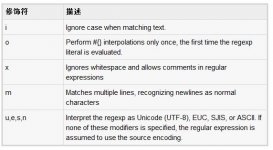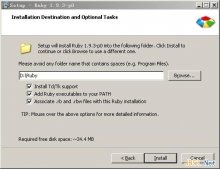Block
定义
|
1
2
3
4
5
6
7
|
some_array.each { |value| puts value + 3 }sum = 0other_array.each do |value| sum += value puts value / sumend |
- A block is somewhat like the body of an anonymous method
- Block can take parameters
- Block 只有被 method 调用时才会起作用,如果 method 中有参数,block 出现在最后面
Block 中的变量
如果 block 的本地变量的名字和 block 之外但是在同样 scope 里面的 变量名字一样,那他们两个是一样的。block 内变量的值会改变 block 外变量的值。
|
1
2
3
4
5
6
|
sum = 0[1,2,3,4].each do |value| sum += value puts value / sumendputs sum # => 30 |
如果 block 中的变量只出现在 block 中,那么它只是 block 中本地变量,无法在 block 之外被引用。
|
1
2
3
4
5
6
7
8
9
10
11
12
13
14
15
16
17
18
19
20
21
22
23
24
25
26
27
28
|
sum = 0[1,2,3,4].each do |value| square = value * value sum += squareendputs sum # => 30puts square # undefined local variable or method 'square' for main:Object <NameError>Parameters to a block are always local to a block, even if they have the same name as locals in the surrounding scope.value = "some shape"[1,2].each { |value| puts value }puts value# 1# 2# some shapeYou can define a block-local variables by putting them after s semicolon in the block's parameter listsquare = "some shape"sum = 0[1,2,3,4].each do |value; square| square = value * value sum += squareendputs sum # 30puts square # some shape |
- By making square block-local, values assigned inside the block will not affect the value of the variable with the same name in the outer scope.
- Blocks for Transactions
- You can use blocks to define a chunk of code that must be run under some kind of transnational control
|
1
2
3
4
5
6
7
8
9
10
11
12
13
|
class File def self.open_and_process(*args) f = File.open(*args) yield f f.close endendFile.open_and_process("testfile","r") do |file| while line = file.gets puts line endend |
Blocks Can Be Objects
You can convert a block into an object, store it in variables, pass it around, and then invoke its code later.
如果 method 的最后一个参数前面有 & 符号 (&action), 那么当此 method 被调用时,Ruby 会找一个 code block, 这个 code block 被转换成 class Proc 的一个对象。
|
1
2
3
4
5
6
7
8
9
10
11
12
13
14
15
16
17
18
19
20
21
22
23
24
25
26
27
|
class ProcExample def pass_in_block(&action) @stored_proc = action end def use_proc(parameter) @store_proc.call(parameter) endendeg = ProcExample.neweg.pass_in_block { |param| puts "The parameter is #{param}" }eg.use_proc(99)# => The parameter is 99def create_block_object(&block) blockendbo = create_block_object { |param| puts "You called me with #{param}" }bo.call 99 # => You called me with 99bo.call "cat" # => You called me with catRuby have two built-in methods that convert a block to an object: lambda and Proc.newbo = lambda { |param| puts "You called me with #{param}" }bo.call 99 # => You called me with 99 |
- Blocks Can Be Closures
- Closure: Variables in the surrounding scope that are referenced in a block remain accessible accessible for the life of that block and the life on any Proc object created from that block.
|
1
2
3
4
5
6
7
8
9
10
11
12
13
14
15
16
17
18
19
20
21
22
23
24
25
26
27
28
29
30
31
|
def n_times(thing) lambda {|n| thing * n}endp1 = n_times(23)p1.call(3) #=> 69p2.call(4) #=> 92def power_proc_generator value = 1 lambda { value += value }endpower_proc = power_proc_generatorputs power_proc.call # 2puts power_proc.call # 4lambda 表达式的另一种简写方式lambda { |params| ... }# 与下面的写法等价-> params { ... }# parmas 是可选的proc1 = -> arg1, arg2 {puts "#{arg1} #{arg2}"}proc1.call "hello", "world"# => hello worldproc2 = -> { "Hello World" }proc2.call # => Hello World |
Block Parameter List
Blocks can take default values, splat args, keyword args and a block parameter
|
1
2
3
4
5
6
7
8
9
10
|
proc = -> a, *b, &block do puts "a = #{a.inspect}" puts "b = #{b.inspect}" block.callendproc.call(1,2,3,4) {puts "in block"}# a = 1# b = [2,3,4]# in block |




